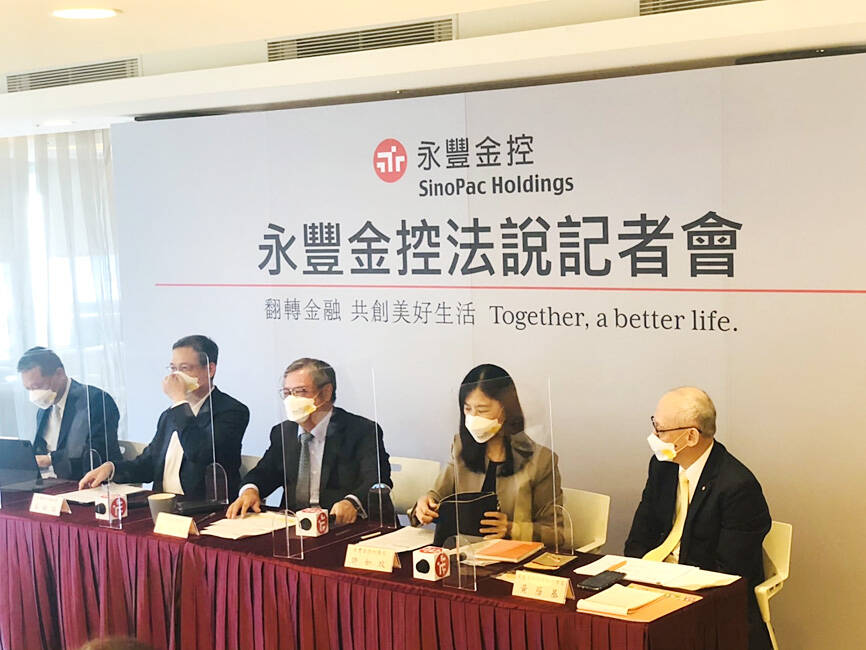SinoPac Financial Holdings Co’s (永豐金控) banking and securities units reported mixed performance for the first half of the year, as rate hikes worldwide boosted the bank’s interest-based income, but also affected global stock markets, the company told an investors’ conference in Taipei yesterday.
Bank SinoPac’s (永豐銀行) net income grew 27 percent to NT$7.5 billion (US$246.43 million) for the first six months, as its net interest income reached a record-high NT$6.68 billion in the second quarter, while first-half interest income expanded 17.2 percent year-on-year to NT$12.56 billion, the bank said.
Its profitability gauge, net interest margin (NIM), rose to 1.19 percent at the end of June, up from 1.07 percent at the end of March and compared with 1.04 percent a year earlier, thanks to central banks’ interest rate hikes, it said.

Photo: Kelson Wang, Taipei Times
“We expect our NIM to grow by at least 10 basis points for the whole of this year, from the end of last year,” Bank SinoPac president Eric Chuang (莊銘福) said.
Despite weakening financial markets, which generally lead to a decline in a bank’s wealth management business, SinoPac’s wealth management unit posted 3 percent annual growth in net fee income, it said.
In contrast, SinoPac Securities Co’s (永豐金證券) net income plunged 63 percent to NT$892 million for the first half of the year, while capital gains plummeted 85 percent to NT$106 million and revenue dropped 22 percent to NT$4.69 billion, as local equities performed poorly, company data showed.
The securities firm attributed the fall in net income to a double-digit percentage drop in stock market turnover in the first half of the year.
In the first six months, SinoPac Financial’s net income fell 4.2 percent to NT$8.22 billion from a year earlier, it said.
However, its cumulative net income in the first seven months had already returned to positive territory, at NT$10.31 billion, making it the only financial holding firm among its local peers to do so, president Stanley Chu (朱士廷) said.
The company also expects the central bank to continue to raise rates this month, and the US Federal Reserve’s hawkish comments last week indicated that it would continue rate hikes, Chu said.
“Investment will be more difficult by the end of the year, so we will stick to a conservative approach,” he said.

‘SWASTICAR’: Tesla CEO Elon Musk’s close association with Donald Trump has prompted opponents to brand him a ‘Nazi’ and resulted in a dramatic drop in sales Demonstrators descended on Tesla Inc dealerships across the US, and in Europe and Canada on Saturday to protest company chief Elon Musk, who has amassed extraordinary power as a top adviser to US President Donald Trump. Waving signs with messages such as “Musk is stealing our money” and “Reclaim our country,” the protests largely took place peacefully following fiery episodes of vandalism on Tesla vehicles, dealerships and other facilities in recent weeks that US officials have denounced as terrorism. Hundreds rallied on Saturday outside the Tesla dealership in Manhattan. Some blasted Musk, the world’s richest man, while others demanded the shuttering of his

ADVERSARIES: The new list includes 11 entities in China and one in Taiwan, which is a local branch of Chinese cloud computing firm Inspur Group The US added dozens of entities to a trade blacklist on Tuesday, the US Department of Commerce said, in part to disrupt Beijing’s artificial intelligence (AI) and advanced computing capabilities. The action affects 80 entities from countries including China, the United Arab Emirates and Iran, with the commerce department citing their “activities contrary to US national security and foreign policy.” Those added to the “entity list” are restricted from obtaining US items and technologies without government authorization. “We will not allow adversaries to exploit American technology to bolster their own militaries and threaten American lives,” US Secretary of Commerce Howard Lutnick said. The entities

Minister of Finance Chuang Tsui-yun (莊翠雲) yesterday told lawmakers that she “would not speculate,” but a “response plan” has been prepared in case Taiwan is targeted by US President Donald Trump’s reciprocal tariffs, which are to be announced on Wednesday next week. The Trump administration, including US Secretary of the Treasury Scott Bessent, has said that much of the proposed reciprocal tariffs would focus on the 15 countries that have the highest trade surpluses with the US. Bessent has referred to those countries as the “dirty 15,” but has not named them. Last year, Taiwan’s US$73.9 billion trade surplus with the US

Prices of gasoline and diesel products at domestic gas stations are to fall NT$0.2 and NT$0.1 per liter respectively this week, even though international crude oil prices rose last week, CPC Corp, Taiwan (台灣中油) and Formosa Petrochemical Corp (台塑石化) said yesterday. International crude oil prices continued rising last week, as the US Energy Information Administration reported a larger-than-expected drop in US commercial crude oil inventories, CPC said in a statement. Based on the company’s floating oil price formula, the cost of crude oil rose 2.38 percent last week from a week earlier, it said. News that US President Donald Trump plans a “secondary